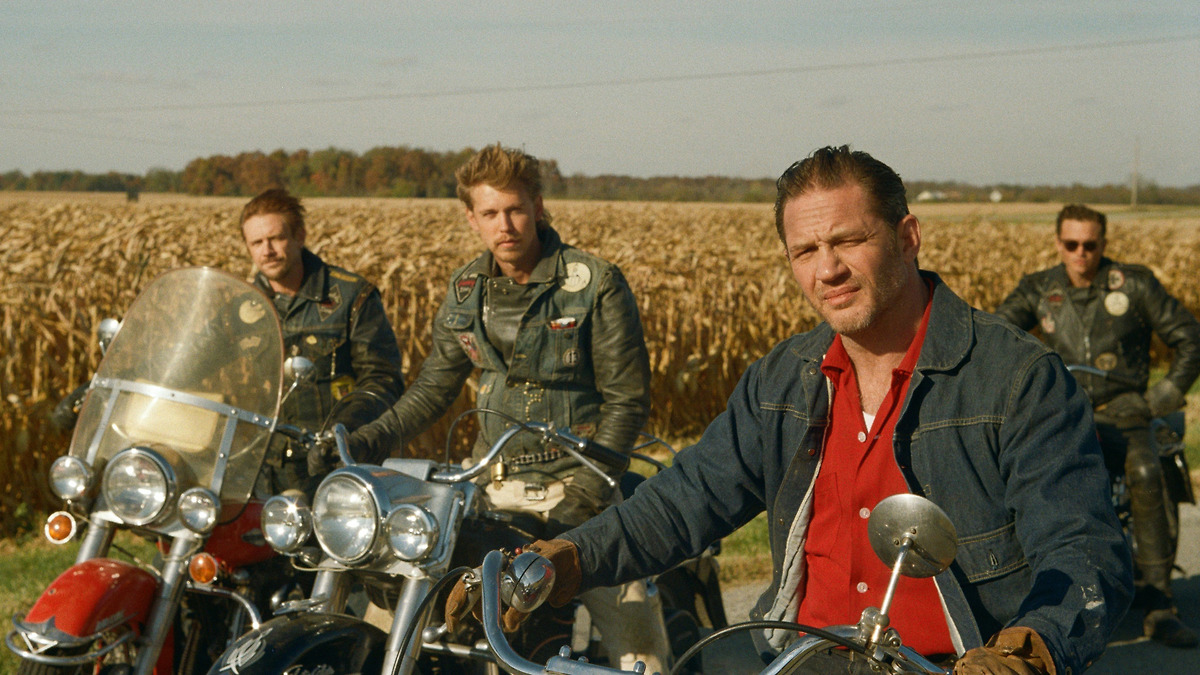“The Bikeriders” Review
Director: Jeff Nichols Screenwriter: Jeff Nichols Cast: Jodie Comer, Austin Butler, Tom Hardy, Michael Shannon, Mike Faist, Norman Reedus Distributor: Focus Features Running Time: 116 min. MPAA: R
Jeff Nichols’s film about motorcycle gangs doesn’t so much adapt from Danny Lyon’s non-fiction book as much as it embodies that hunt for something within the fumes of exhaust, masculinity, and beer. As relayed through the framing device of biker wife Kathy (Jodie Comer) speaking with a depiction of Lyon (Mike Faist), there was a level of comfort and community that was almost unspoken between the gang and their family. The many snapped photos perhaps reveal more than the interviews, as do this film’s many scenes of characters just hanging out from the 1960s to 1970s.
In her midwest accent, Kathy speaks of her hooking up with the Vandals of Chicago more of a ride offered that was too enticing not to accept and too scary to get off. She speaks of how drawn she was to the cool Benny (Austin Butler), quietly hounding her and loudly riding his motorcycle through red lights. She talks about the Vandals leader Johnny (Tom Hardy) with his obsession and emulation of what it means to run a biker gang. He favors the lifestyle of drinking with the boys, torching down establishments, and getting into fights. Of course, he’ll preference those fights with a certain professionalism, clarifying “fists or knives” before choosing a venue.
The film jumps from scene to scene as it fully defines every member of the gang, sometimes being documented by Lyon with interviews. The journalist draws his microphone on the older biker, Zipko (Michael Shannon), getting his perspective on the world and his definition of the label “Pinko.” Characters like Cal (Boyd Holbrook) and Brucie (Damon Herriman) stay loyal to the gang, but find themselves quietly questioning the directions it may be headed towards. And then there are members who just seem to mosey down their path, as with the visiting Funny Sonny (Norman Reedus), hailing from California. Just when it feels like we’re getting to know these folks, the gang scene takes a violent turn and the halcyon days of riding, drinking, and brawling become hazy dreams.
Nichols plays his film more in the style of a Richard Linklater production, giving enough room to hang out with the characters. Most of the actions of the Vandals comes down to a sense of place and power, the two almost arriving inexplicably at times. During a biker rally, Johnny meets with a rival gang and starts a dialogue. Benny, however, gets the ice broken by immediately starting a fight with the other gang. There isn’t so much a language for these skirmishes as there is a vibe for toughness. Johnny accepts a fight from one of his members about expanding their gang into Wisconsin territory. Although Johnny wins the fight, he still accepts the terms, showcasing how loose the rules can be within this gang.
It’s only when the aspiring cyclist Corky (Karl Glusman) enters the scene that the gang starts taking a turn for the worse. New members start joining and forming a nastier vision of motorcycle gangs, based more on the grit of slashing throats more literally than threateningly. It’s only when that reality sets in that the defenses are dropped, where there’s little future in a gang that favors rapes at parties and executions for ascension in the ranks. The dust threatens to consume those who remain for the fast lifestyle, making the inevitable descension of Benny and Johnny as a bitter resolve for what the world has become.
The Bikeriders is uniquely interested more in the power of biker gangs than nuts and bolts of what lies under the hood. That’s for the best, considering how engrossing the film becomes for its collection of noteworthy scenes and performances. At some point, the film stops becoming a dissection of the biker lifestyle and becomes more of a contemplation of such a group’s aesthetic and free-flowing philosophy. It’s a collective of men who felt something compelling when they heard the engines roar as they gripped the handlebars. Rather than fully define that longing for masculine power and motorcycle obsession, this film takes that sensation and rides with it, appreciating all the marvelous moments along the way.


